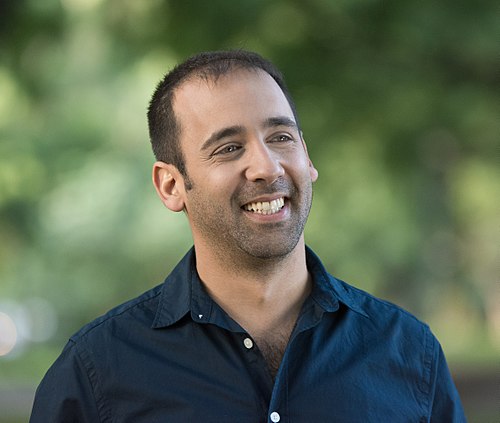Itai Hagman
 From Wikipedia the free encyclopedia
From Wikipedia the free encyclopedia
Itai Hagman | |
|---|---|
| National Deputy | |
| Assumed office 10 December 2019 | |
| Constituency | City of Buenos Aires |
| Personal details | |
| Born | 13 February 1983 Jerusalem, Israel |
| Political party | Patria Grande Front |
| Other political affiliations | Unidad Porteña (2017–2019) Frente de Todos (2019–present) |
| Alma mater | University of Buenos Aires |
| Profession | Economist |
Itai Hagman (born 13 February 1983) is an Argentine economist and politician who has been a National Deputy elected in the City of Buenos Aires since 2019. A member of the Patria Grande Front, Hagman was elected in the Frente de Todos list in 2019.
Early life and education[edit]
Hagman was born on 13 February 1983 in Jerusalem.[1] In his youth, he played football in the lower divisions of All Boys.[2] He studied Economic Sciences at the University of Buenos Aires, graduating in 2013. In addition, he counts with a post-graduate degree on Popular Education from Universidad Popular de las Madres de Plaza de Mayo.[3]
Political career[edit]
In March 2010, Hagman was elected co-president of the Federación Universitaria de Buenos Aires (FUBA), Argentina's largest student federation.[4] In 2013, Hagman became part of Marea Popular, a political group formed with the aim of competing in the 2013 legislative election in Buenos Aires. Alongside Popular Unity, Marea Popular formed part of the Camino Popular front; the list, which attained 2.17% of the vote in the P.A.S.O. primaries in August 2013, had Hagman as the first candidate to the Chamber of Deputies.[5]
In 2016, Hagman launched, alongside others, the AHORA Buenos Aires platform. The platform was part of Unidad Ciudadana in Buenos Aires (where it was known as Unidad Porteña), and participated in the 2017 P.A.S.O. primaries against the lists headed by Daniel Filmus and Guillermo Moreno.[6] The AHORA Buenos Aires list landed last in the primaries, and did not get to participate in the general election.[7]
In 2018, he formed part of the foundation of the Patria Grande Front, alongside social leader Juan Grabois and other left-wing activists and politicians.[8] Hagman was first elected to the Chamber of Deputies in 2019 in the Frente de Todos list in Buenos Aires, in which he was the third candidate.[9]
Electoral history[edit]
| Election | Office | List | # | District | Votes | Result | Ref. | |||
|---|---|---|---|---|---|---|---|---|---|---|
| Total | % | P. | ||||||||
| 2019 | National Deputy | Frente de Todos | 3 | City of Buenos Aires | 641,054 | 35.02% | 2nd[a] | Elected | [10] | |
| 2023 | Union for the Homeland | 4 | City of Buenos Aires | 577,225 | 31.41% | 2nd[a] | Elected | [11] | ||
- ^ a b Presented on an electoral list. The data shown represents the share of the vote the entire party/alliance received in that constituency.
References[edit]
- ^ "Itaí Hagman". Directorio Legislativo (in Spanish). Archived from the original on 21 July 2021. Retrieved 20 August 2022.
- ^ "Vendió relojes por Retiro, fue jugador de fútbol y tiene un nombre bíblico". Clarín (in Spanish). 30 July 2013. Retrieved 21 July 2021.
- ^ ""Si se logra la reactivación, habrá que discutir un programa de desarrollo"". Río Negro (in Spanish). 26 January 2020. Retrieved 21 July 2021.
- ^ "La controvertida conducción de la FUBA". La Nación (in Spanish). 26 September 2010. Retrieved 21 July 2021.
- ^ "Elecciones 2013: resultados por provincia, por municipio y por barrio". La Nación (in Spanish). 28 October 2013. Retrieved 21 July 2021.
- ^ "Tres listas competirán en el PJ porteño: Daniel Filmus se medirá con Itaí Hagman y con la dupla Gustavo Vera-Guillermo Moreno". Infobae (in Spanish). 24 June 2017. Retrieved 21 July 2021.
- ^ Paladini, Eduardo (27 August 2017). "Las 5 nuevas incógnitas de la elección porteña". Clarín (in Spanish). Retrieved 21 July 2021.
- ^ Piqué, Martín (16 September 2018). "Grabois aceptó dar la disputa electoral en un gran frente opositor". Tiempo Argentino (in Spanish). Retrieved 21 July 2021.
- ^ "Uno por uno: ¿Quiénes entran al Congreso de la Nación y quiénes perdieron la banca?". iProfesional (in Spanish). 28 October 2019. Retrieved 21 July 2021.
- ^ "Elecciones 2019". argentina.gob.ar (in Spanish). Dirección Nacional Electoral. Retrieved 4 February 2023.
- ^ "Elecciones 2023". electoral.gob.ar (in Spanish). Cámara Nacional Electoral. Retrieved 14 December 2023.
